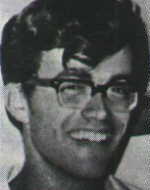Ten-Fee, Shaul
Son of Yehoshua and Aliza. He was born on May 21, 1950, in Tel Aviv, where he moved to Jerusalem, where the boy was connected with all his sensitive soul, and his spiritual image was crystallized in a home where he absorbed the values of nationality and tradition, Poet and head of Haaretz in Jerusalem – gave him a worldview about the uniqueness of the people of Israel and the essence of his redemption in a sovereign state, and his mother had acquired tenderness and warmth, nourishing his soul and forming a warm, uncompromising and honest personality. With an enthusiasm for sport and training in the Scout movement, his wild-haired figure – when he was dancing in a circle, sitting at the piano or walking in the desert My country – was the focus of social activity of the return. When he was recruited into the IDF in August 1968 was set to ask a low medical profile and is assigned to a quartermaster unit. Since then he had not ceased his efforts to improve his physical fitness and his pleas to appear before a medical committee to determine a different medical profile. Finally, Ella Perry and Shaul were assigned to the Armored Corps unit and joined many of his loyal friends, some of whom had parted at an absorption and sorting base. His service in the IDF was a constant struggle for him to be stationed on the first line, in order to realize the values he believed in as the individual’s duty to his country. And his meticulousness in fulfilling the instructions of his commanders, along with the brilliance of his humor during times of crisis, became a common denominator among his friends, and at the end of his training he was sent to the area of the Suez Canal. “I go to a combat unit, because the state needs me there. This is my country, “wrote the patrol unit, where Mila served vital positions along the eastern bank of the canal, and was able, from time to time, to fill outposts with their strength and strength. The war of attrition in the Canal area occupied many of the soldiers of the outpost, and Shaul was prepared to embark on missions beyond his own duty.In the course of time, Saul realized what the sorry price had been paid One by one his friends fell in front of him. Every morning he called his parents’ apartment in Jerusalem to demand their safety, and in fact told him that he was not harmed, and his commanders asked him to continue to serve in the outpost even after the usual period, because of his contribution to the fighting skills and the strength of his soldiers. In his last vacation he made a farewell journey among his friends and toured the city of Jerusalem he loved on Wednesday, 16 October 1969, when he was killed by enemy shelling in the front post on which he was on duty. Was laid to rest in the military cemetery on Mount Herzl in Jerusalem. The head of the Personnel Directorate approved the rank of corporal who had been in force since the day they fell. His commander, who eulogized him at the open grave, noted his place in the unit and the perfection with which he performed his duties: “He was always full of joy of life and during every break in training the group was mostly concentrated around him.” “His voice was above everyone else, in ideological debates and in conversations about drills, he was popular with his friends, and in training he always seemed to help friends out of my friends’ attitude because he saw the success of his department as a personal achievement.” In his memory and hersHis name was published a book called Shaul Haya – a story of a soldier in the Sayeret who tells his life story and includes paintings he made.
